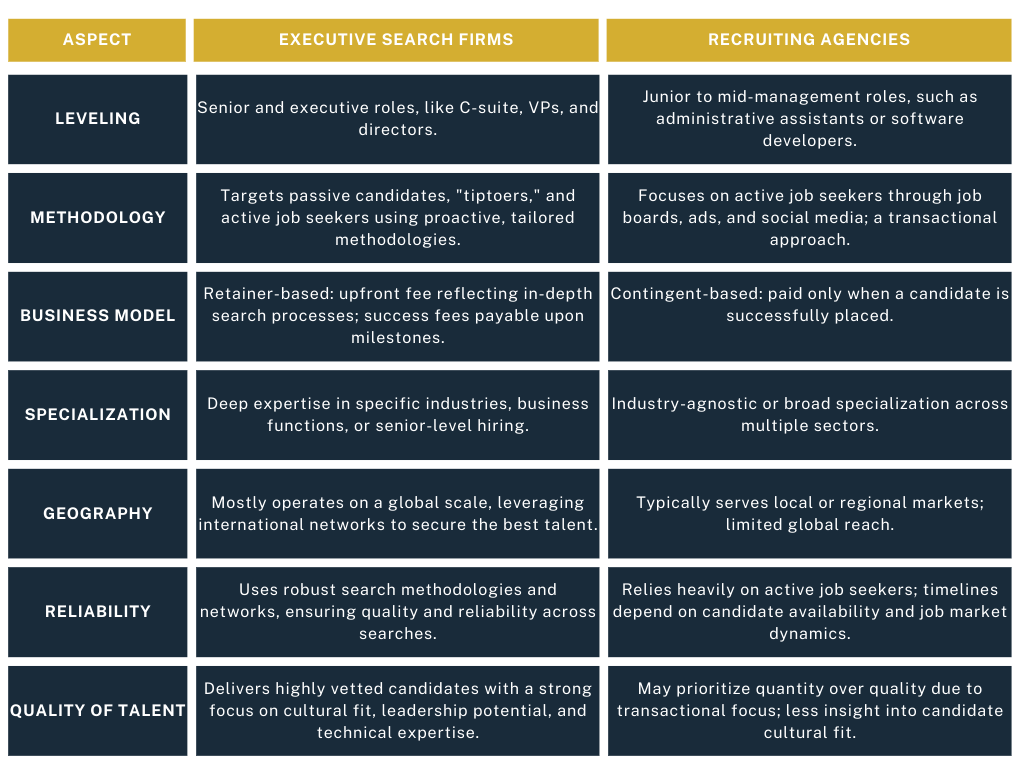What if your top-performing executive walks out the door tomorrow? Suddenly, your leadership team is a seat short, and the ripple effect shakes the entire organization. But here’s the real kicker—what’s the hidden cost of losing that kind of talent? It’s more than just recruitment expenses or the scramble to fill the void. It’s the priceless expertise that walks out with them, the drop in team morale, and the stalling of momentum that can set your organization back for months.
Retaining top executive talent is critical, not only for keeping your business on track but for fueling its growth and success. Today, attracting and retaining top C-level talent is harder than ever. Today’s executives seek flexibility, growth opportunities, support, and empathy. Yet, many organizations are out of sync with what candidates truly need, leading to a disconnect that hampers long-term retention.
Before we get into strategies for retaining top executive talent, let’s talk about the steep price of leadership turnover:
- Financial Impact: Replacing an executive is a major financial setback. For C-suite or senior leadership positions, the costs of recruiting and onboarding can escalate significantly, impacting your bottom line even more.
- Productivity Loss: It can take up to two years for a new executive to achieve the same strategic impact and decision-making efficiency as an experienced leader, hindering organizational momentum and progress.
- Knowledge Drain: When key executives depart, they take with them invaluable leadership experience, strategic insight, and institutional knowledge. Replacing this expertise is not only difficult but can create a leadership vacuum that disrupts your company’s direction.
- Morale: The exit of a senior leader often sends shockwaves through the organization, affecting the morale of other executives and key talent. Their departure can leave teams feeling uncertain about the company’s future, undermining confidence and productivity at all levels.
7 Strategies for Retaining Top Executive Talent
1. Create Meaningful Work and Purpose
People want to feel that their work matters, and this can actually make a difference in retaining the top executive talent. Make sure your leaders understand how their roles contribute to the greater mission of the company.
Action Steps:
- Clearly communicate your company’s mission
- Align individual roles with company goals
- Offer opportunities for employees to engage in social impact initiatives
2. Build a Positive, Inclusive Culture
A positive company culture isn’t just a nice-to-have—it’s essential for retaining top executive talent. Research by Deloitte found that 94% of executives believe a strong corporate culture is key to business success. Foster an environment where inclusion, transparency, and open communication thrive.
Action Steps:
- Define and reinforce core company values
- Build an inclusive, diverse workplace
- Foster transparency and communication at all levels
3. Offer Competitive Compensation and Benefits
It’s no secret that money talks, but it’s not just about salary—it’s about offering a comprehensive benefits package. Keep your pay scales competitive with industry standards and show your leaders that you value their contribution with performance-based bonuses and generous health and retirement plans.
Action Steps:
- Conduct annual salary reviews
- Offer performance-based incentives
- Provide comprehensive health benefits
4. Foster Career Growth and Development
Top talent is always looking to level up. Create opportunities for growth, whether through mentorship, job rotations, or leadership programs. Hire executives who are not only experienced but committed to fostering development within their teams.
Action Steps:
- Establish clear career paths
- Invest in leadership development
- Offer cross-functional opportunities
5. Provide Work-Life Balance and Flexibility
Flexibility in work hours and remote options can significantly boost employee loyalty. A study by FlexJobs revealed that 80% of workers would be more loyal to their employers if they offered flexible work options.
Action Steps:
- Offer flexible work hours
- Provide remote work options
- Encourage time off to recharge
6. Recognize and Appreciate Contributions
Recognition is a powerful motivator. Executives who don’t feel adequately recognized are twice as likely to quit within the next year but retaining top executive talent is crucial for your organization. A simple “thank you” or a more formal recognition program can make all the difference in fostering loyalty.
Action Steps:
- Implement formal recognition programs
- Encourage peer-to-peer shout-outs
- Celebrate achievements publicly
7. Give and Receive Regular Feedback
Feedback is the fuel that drives growth and can aid in retaining top executive talent. Regular check-ins and performance reviews show that you care about their development and success.
Action Steps:
- Hold regular one-on-ones with employees
- Implement quarterly performance reviews
- Use 360-degree feedback for holistic growth
Cultivating a Culture of Retaining the Top Executive Talent
The organization should create an environment that nurtures growth, values contributions, and offers flexibility for retaining top executive talent. By prioritizing regular engagement, fostering open communication, and supporting well-being, you ensure your leaders not only stay but thrive, driving your company’s success and growth.
By investing in your people—offering career development, recognizing effort, providing flexibility, and fostering a supportive culture—you’re not just retaining top executive talent. You’re creating an environment where top performers feel valued, engaged, and committed to your company’s long-term success. It’s not just about compensation—leadership, values, culture, and a clear purpose matter. Defining your organization’s purpose should be a thoughtful, inclusive process, driven by authenticity, not just top executives.
Building a Winning Team: Attracting and Retaining Top Executive Talent with MS
Finding a leader who will shape your company’s future, inspire innovation, and drive lasting impact. Our executive search solutions are designed to identify and recruit exceptional leaders who align with your organization’s values, vision, and strategic objectives. We work closely with you to ensure that each leader we place not only excels in the role but also strengthens your leadership team. Let us help you build a powerful, forward-thinking leadership team that will drive your company to new heights.










